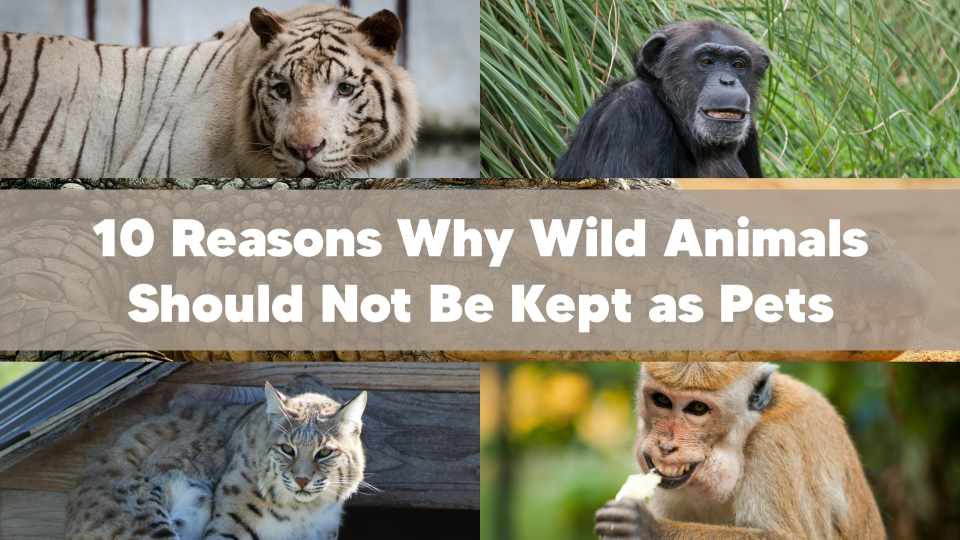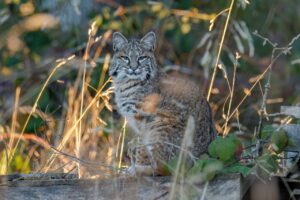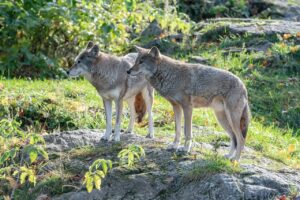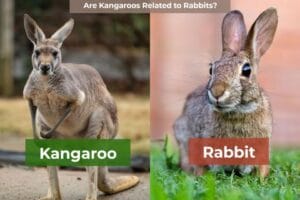Wild animals sometimes look cute and cuddly, and most humans might begin to fantasise about keeping them as pets.
This can be dangerous to both animals and humans because, unlike domesticated animals, wild animals can be unpredictable.
In this article, we will look at 10 reasons why wild animals should not be kept as pets.
The 10 Reasons Why Wild Animals Should Not Be Kept as Pets
1. Unpredictable Behaviour
Wild animals are wild for a reason. They are already used to surviving in the wild and can exhibit unpredictable behaviour.
Their instincts can lead them to do things you might never expect, and sometimes these things can be dangerous. Unlike domesticated pets like dogs and cats, wild animals are not bred to live alongside humans.
They might begin to perceive their caretakers as threats, and this can cause stress or fear in wild animals. The outcome can be fleeing, hiding, or attacking, depending on the situation.
2. Stress and Anxiety
Even domesticated animals have to be trained most of the time to be able to live happily as pets. Wild animals that are removed from their natural habitat can find it hard to adjust to the new environment.
This change in environment and constant interactions with humans can lead to stress and anxiety. They can be dangerous to humans because these emotions often trigger defensive behaviours.
For instance, wild animals like monkeys may become aggressive as they get older, and others might require precise habitats to remain healthy.
3. Zoonotic Diseases
Another reason wild animals should not be kept as pets is because of zoonotic diseases. These are diseases that can be transmitted from animals to humans.
These diseases that affect animals can also be contagious to humans through direct contact, bites, or scratches. Examples of some zoonotic diseases are rabies through bites or Salmonellosis through contact with infected animals.
Most pets have been vaccinated and respond well to treatment from vets, but for wild animals the case is different. They are meant to live in the wild, where they survive on their own without help from humans.
4. They can attack
Since wild animals are unpredictable, you can never tell what they will do next. Most wildlife have sharp claws and teeth that can cause serious injuries to humans.
Even some cute and cuddly animals that look harmless can become aggressive if they feel threatened.
I will use the case of Travis the Chimpanzee as an example. Travis was a male Chimpanzee that lived with a woman named Sandra Herold in Stamford, Connecticut.
What Happened? Well, Travis attacked Herold’s friend, Charla Nash, and inflicted serious injuries on her. That outcome was not expected by anyone and resulted in serious injuries.
5. Impact on Wildlife Populations
Another reason is because of the negative effects it can have on their population. Removing wildlife from their natural habitat in large numbers can lead to the animals being endangered.
An example is the high demand for exotic pets like parrots. This led to parrot species like the African Grey Parrot being listed as endangered.
6. Animal Welfare
Domesticated pets may not need much care and attention and may not be demanding. Wild animals can have complex needs that might be difficult to meet in a domestic setting.
Some wild animals may need to be fed specific diets, require certain social interactions with fellow animals, and live out in the open.
When they are kept indoors as pets, this can impact negatively on their welfare.
7. Legal Issues
In most countries, it is illegal to keep certain wild animals as pets. These laws are put in place to protect both the animals and humans.
Sometimes a permit is required to own wildlife. For example, in the year 2019, a man was arrested in Houston, Texas, for owning a tiger. Although Texas allows tiger ownership under certain regulations, the man faced legal penalties because he lacked the required permits.
Other laws include strict wildlife import laws. These laws are meant to protect not just the owners but neighbours who might not be aware of the presence of wildlife.
8. Long-Term Commitment
Unlike some domestic animals, like dogs and cats, that live for a few years, some wild animals can live for many years. This means a long-term commitment for their owners.
These animals can continue to live even after their owners have passed on. This can be trouble for whoever will inherit the animal.
The animal might even become aggressive toward the new owners, which can be dangerous.
Even if these animals are sent back into the wild after all this time, they might find it difficult to survive on their own.
9. Danger to Children
It will not be wise to keep wild animals around children. They can become dangerous and mistake the child as a threat.
Even if they decide to play with children, they can still inflict serious injuries without being aware of what they have done. A playful swipe from a large cat or monkey can cause severe injuries to a child.
10. Escape Risks
Wild animals might try to escape captivity and wander into the community, where they can be a risk.
Domestic pets like dogs and cats also try to escape into the open, but for wild animals, escaping into the street can be harmful.
Conclusion
Most of the time, people help wild animals and then decide to take them into their homes to care for them. This might seem like a good thing to do, but the animal might not understand what you are trying to do.
In this article, I have covered the 10 reasons why wild animals should not be kept as pets. This article is meant to educate you about the dangers of keeping wildlife as pets.
FAQs
What are the dangers of wild animals?
Aside from inflicting serious injuries, wild animals can transmit diseases. These diseases can be fatal to humans.
Can wild animals ever be domesticated?
No, wild animals cannot be domesticated in the same way as dogs or cats.

Hi, I’m Louis Ojibe, and I grew up around wildlife in Africa. I have always been fascinated by animals and nature across the world.
As a child, my parents used to take me to see wild animals like lions, elephants, gorillas, tortoises, and many others at our local zoo.












